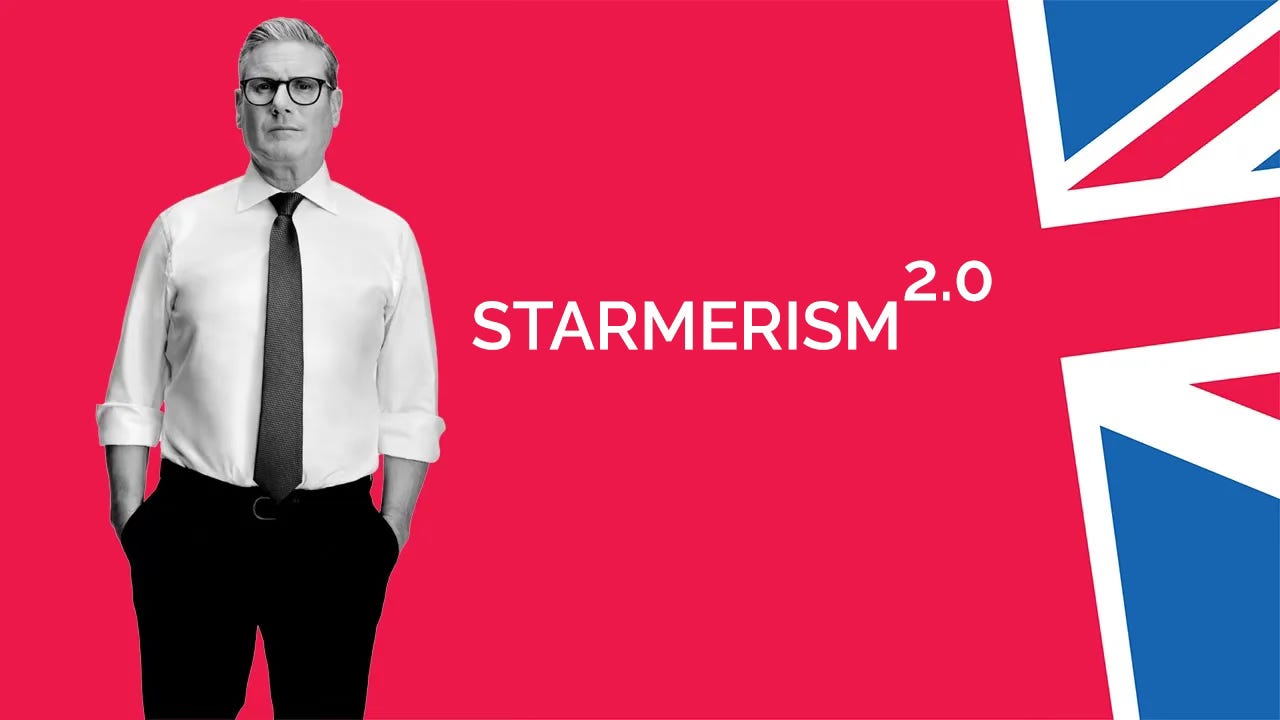A Manifesto for Starmerism 2.0
What's the big idea? I have an answer.
POD! On The Abundance Agenda this week, Martin exposes the myth of ‘land banking’ and reveals what is really screwing up the housing market. Then I talk about Boris Island (which I still secretly think is a good idea), and explore a new paper that sets out a plan that could see the Third Runway finished before the next election.
Plus our special guest this week is the brilliant Michael Dnes, who tells us about his plan for speeding up infrastructure planning, and the mad story of how a nuclear plant was built in the middle of Snowdonia national park… and how the planning inquiry took just three days. Listen on Apple, Spotify or Substack.
We’re now a year into a Labour government and… everyone seems pretty miserable about it.
A couple of weeks ago, I was at an event full of Labour people, and one person there asked me with alarming sincerity if I could give them a reason for hope. Then, earlier this week I was in Westminster, having been inexplicably invited to a super fancy, Labour-aligned party,1 where a senior Labour figure opened their speech by admitting to the audience that “It’s been a tough year”.
To be fair, it’s easy to understand why everything feels so gloomy. Though the government has done lots of good, nudging the ball forward in many important ways, it still feels as though things aren’t improving fast enough. The long-term measures, like planning reform, will take years to pay off. And in the short-term, every month there’s the drumbeat of disappointing inflation and GDP figures to remind us of the hole Britain is in. And, of course, in the background to all of this, the spectre of Nigel Farage in Number 10 looms large.
And to be fair, many of these challenges are beyond the current government’s control. Externally, Britain faces an impossibly bleak international situation. And unlike Tony Blair, Keir Starmer entered office after a generation of zero-growth with no ‘peace dividend’ to spend on improving public services.
However, there are also problems that the government can control. And one issue is the ideological vacuum at the heart of the Starmer project, which is almost by design. The authors of Get In reveal that the Prime Minister once said “There is no such thing as Starmerism”.
This is a problem that is widely recognised by Westminster types, but for a long time my gut reaction was that worrying about ideology or ‘narrative’ is overblown. I thought it was just a meaningless criticism thrown out by wordcel lobby journalists who are addicted to drama, as a way to fill space without engaging in deadly boring issues like, er, government policy.
However, I’m increasingly convinced that perhaps ideology does actually matter. Maybe it’s because I now sometimes find myself at Westminster parties, but I’ve been persuaded that the absence of “Starmerism” does actually matter.
Why? Because an ideology and a narrative are important for two audiences.
First, there are the ministers and the bureaucrats actually operating the levers of power, for whom ideology is a useful proxy for weighing decisions. Much as Christians might ask “What would Jesus do?”, having a mechanism to divine an answer to “What would Starmer do?” gives decisions coherence and direction.
This is perhaps why in the first year some of the most effective bits of government have been those with what the Institute for Government’s Hannah White describes as a “clear ministerial direction”, like the Department for Energy Security and Net Zero, where Ed Miliband has his own clear programme of what he wants to achieve.
And then there is the grubby business of politics.
For a political party, ideology explains why decisions are being made. It defines the vision of what the government is actually aiming to achieve. And it makes sometimes painful choices – like supporting controversial welfare cuts or draconian immigration measures – easier to stomach, as it frames the sacrifice as being in service of a widely understood greater goal.
So I think a clear sense of ideology actually matters, and we can see this by looking back at history.
For example, one of the reasons why Margaret Thatcher (for better or worse) changed Britain so much during her time in office was because there was no doubt about what she wanted to achieve, in terms of privatisation and the shrinking of the state.
The same can be said for Tony Blair and Blairism, which was best summed up by the Peter Mandelson line about how he was “intensely relaxed about people getting filthy rich as long as they pay their taxes”.
So this is why I’ve ultimately landed where the chuntering classes are: Keir Starmer needs to tell us – or more importantly his government and his party – what he thinks ‘Starmerism’ should be. He needs to hammer out a new definition of Starmerism to give his agenda more coherence, and more direction than the void of Starmerism 1.0.
In other words, it’s time for the Prime Minister to set out the stall for Starmerism 2.0.
And I’ve got a suggestion about what it should be.
Keep reading with a 7-day free trial
Subscribe to Odds and Ends of History to keep reading this post and get 7 days of free access to the full post archives.



